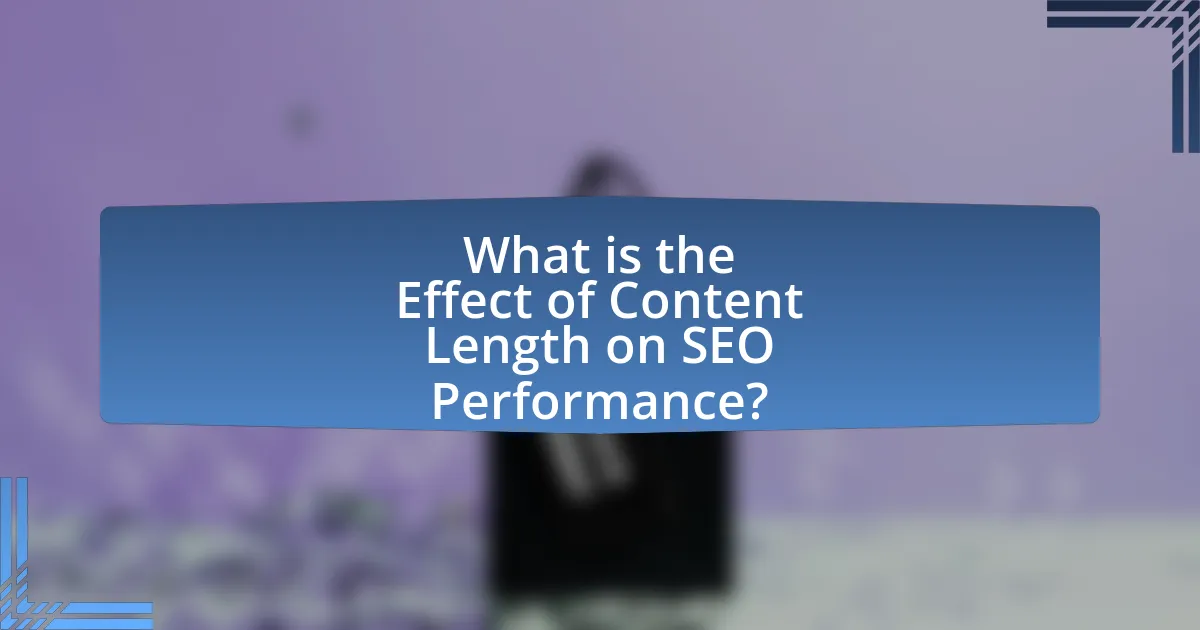The article examines the impact of content length on SEO performance, highlighting that longer articles, typically exceeding 1,500 words, tend to rank higher in search engine results. Research indicates that top-ranking pages average around 1,890 words, correlating with increased organic traffic, backlinks, and user engagement. The discussion includes how content length influences keyword optimization, user engagement metrics, and the effectiveness of SEO strategies across different industries. Additionally, it outlines best practices for balancing content length with quality and relevance to enhance overall SEO performance.

What is the Effect of Content Length on SEO Performance?
Content length significantly affects SEO performance, with longer content generally ranking better in search engine results. Research indicates that articles with a word count of 1,500 words or more tend to receive more backlinks and social shares, which are critical factors for SEO. A study by Backlinko found that the average content length of a top-ranking page on Google is around 1,890 words, demonstrating a clear correlation between content length and higher search rankings. Additionally, longer content allows for more comprehensive coverage of topics, which can enhance user engagement and dwell time, further boosting SEO performance.
How does content length influence search engine rankings?
Content length significantly influences search engine rankings, as longer content tends to rank higher in search results. Research indicates that articles with over 1,500 words often perform better in terms of organic traffic and backlinks compared to shorter content. For instance, a study by Backlinko analyzed 11.8 million Google search results and found that the average content length of a top-ranking page was around 1,890 words. This correlation suggests that search engines may favor comprehensive content that provides in-depth information, thereby enhancing user engagement and satisfaction.
What role does content length play in keyword optimization?
Content length significantly influences keyword optimization by affecting search engine rankings and user engagement. Research indicates that longer content, typically exceeding 1,500 words, tends to rank higher on search engine results pages (SERPs) because it often provides more comprehensive information, which aligns with search engine algorithms favoring depth and relevance. A study by Backlinko analyzed over 11 million Google search results and found that the average content length of a top-ranking page is around 1,890 words, demonstrating a clear correlation between content length and keyword optimization effectiveness.
How does content length affect user engagement metrics?
Content length significantly impacts user engagement metrics, with longer content generally leading to higher engagement rates. Research indicates that articles with a word count of 1,500 words or more tend to receive more shares and backlinks compared to shorter articles. For instance, a study by HubSpot found that blog posts between 2,250 and 2,500 words receive the most organic traffic, suggesting that users engage more with comprehensive content. Additionally, longer content often provides more in-depth information, which can enhance user satisfaction and time spent on the page, further boosting engagement metrics.
Why is content length important for SEO strategies?
Content length is important for SEO strategies because longer content tends to rank higher in search engine results. Research indicates that content with a word count of over 1,500 words often performs better in terms of organic traffic and engagement. For instance, a study by Backlinko found that the average content length of a top-ranking page on Google is approximately 1,890 words. This correlation suggests that comprehensive content provides more value, addresses user queries more effectively, and increases dwell time, all of which are favorable for SEO performance.
What are the correlations between content length and organic traffic?
Longer content generally correlates with higher organic traffic. Studies indicate that articles exceeding 1,500 words tend to rank better in search engine results, leading to increased visibility and traffic. For instance, a study by Backlinko analyzed over 11 million Google search results and found that the average content length of a page that ranks in the top 10 results is around 1,890 words. This suggests that search engines may favor comprehensive content that provides in-depth information, thereby attracting more organic visitors.
How do search engines evaluate content length in their algorithms?
Search engines evaluate content length by analyzing the relationship between the length of content and its relevance to user queries. Longer content often provides more comprehensive information, which can lead to higher rankings in search results. Studies have shown that content exceeding 1,500 words tends to perform better in terms of organic traffic, as it is perceived to offer more value and depth. For instance, a study by Backlinko found that the average content length of top-ranking pages on Google is around 1,890 words, indicating that search engines favor longer, more detailed articles that effectively address user intent.
What are the optimal content lengths for different types of content?
The optimal content lengths for different types of content vary based on the format and purpose. For blog posts, a length of 1,500 to 2,500 words is often recommended, as studies show that longer articles tend to rank better in search engines due to their comprehensive nature. For social media posts, 40 to 80 characters for Twitter and 100 to 250 characters for Facebook are optimal for engagement. For landing pages, 500 to 1,000 words is effective, balancing detail with user attention. Research by HubSpot indicates that content around 2,000 words tends to perform best in terms of SEO, as it provides depth and value to readers.
How does the ideal content length vary by industry?
The ideal content length varies significantly by industry, with different sectors requiring tailored approaches for optimal engagement and SEO performance. For instance, in the technology sector, articles averaging 2,000 to 2,500 words tend to perform best, as they provide in-depth analysis and technical details that resonate with the audience. Conversely, the fashion industry often sees higher engagement with shorter content, typically around 1,000 to 1,500 words, which aligns with the fast-paced nature of trends and consumer preferences.
Research by HubSpot indicates that blog posts between 2,250 and 3,000 words generate the most organic traffic across various industries, but this varies; for example, the travel industry benefits from visually rich content that may not require extensive text, while the finance sector often demands comprehensive articles exceeding 2,500 words to cover complex topics thoroughly. Thus, understanding the specific content length that resonates within each industry is crucial for maximizing SEO effectiveness and audience engagement.
What are the recommended content lengths for blog posts versus landing pages?
The recommended content length for blog posts is typically between 1,500 to 2,500 words, while landing pages should ideally be around 500 to 1,000 words. Research indicates that longer blog posts tend to rank better in search engine results, with a study by HubSpot showing that posts with 2,000 words or more receive significantly more traffic and backlinks. In contrast, landing pages focus on concise, persuasive content to drive conversions, which is supported by data from Unbounce that suggests shorter, targeted copy leads to higher conversion rates.
How can content length be effectively measured for SEO performance?
Content length can be effectively measured for SEO performance by analyzing metrics such as organic traffic, keyword rankings, and user engagement. Research indicates that longer content, typically over 1,500 words, tends to rank higher in search engine results due to its ability to provide comprehensive information, which aligns with Google’s preference for quality content. A study by Backlinko found that the average content length of a top-ranking page is around 1,890 words, demonstrating a correlation between content length and SEO success. Additionally, tools like Google Analytics can track user behavior metrics, such as time on page and bounce rate, which further reflect how content length impacts user engagement and, consequently, SEO performance.
What tools can be used to analyze content length and its impact?
Tools that can be used to analyze content length and its impact include Google Analytics, SEMrush, and Yoast SEO. Google Analytics provides insights into user engagement metrics, allowing users to correlate content length with metrics such as bounce rate and average session duration. SEMrush offers keyword analysis and content audit features that help assess how content length affects search rankings and visibility. Yoast SEO evaluates content readability and length, providing recommendations for optimization based on best practices. These tools collectively enable users to understand the relationship between content length and SEO performance effectively.
How do you track changes in SEO performance related to content length adjustments?
To track changes in SEO performance related to content length adjustments, utilize analytics tools to monitor key performance indicators such as organic traffic, bounce rate, and keyword rankings. By comparing these metrics before and after content length modifications, one can assess the impact of the changes. For instance, a study by HubSpot found that longer content tends to generate more backlinks and higher search engine rankings, indicating a correlation between content length and SEO performance. Therefore, analyzing these metrics over time provides concrete evidence of how content length adjustments influence SEO outcomes.
What best practices should be followed regarding content length for SEO?
For optimal SEO performance, content length should generally be between 1,000 to 2,500 words, as longer content tends to rank better in search engine results. Research by Backlinko indicates that the average content length of a top-ranking page is around 1,890 words, suggesting that comprehensive articles provide more value and are favored by search algorithms. Additionally, content should be long enough to cover the topic thoroughly while maintaining reader engagement, as user experience metrics like time on page and bounce rate also influence SEO rankings.
How can you balance content length with quality and relevance?
To balance content length with quality and relevance, focus on delivering comprehensive information while ensuring clarity and engagement. Research indicates that content exceeding 1,500 words tends to perform better in search rankings, as it often provides more in-depth insights (Backlinko, 2020). However, maintaining quality is crucial; each section should serve a purpose and directly address user intent. By prioritizing relevant keywords and structuring content with headings and bullet points, you can enhance readability without sacrificing depth. This approach ensures that longer content remains valuable and engaging, ultimately improving SEO performance.
What strategies can enhance SEO performance while optimizing content length?
To enhance SEO performance while optimizing content length, focus on creating high-quality, relevant content that addresses user intent effectively. This involves conducting thorough keyword research to identify terms that resonate with your target audience, ensuring that the content is concise yet comprehensive enough to cover the topic adequately.
Additionally, utilizing structured data and optimizing meta tags can improve visibility in search results without necessitating longer content. According to a study by Backlinko, pages with higher word counts tend to rank better, but the key is to balance quality and length; content that is too lengthy without adding value can lead to higher bounce rates. Therefore, maintaining clarity and relevance while adhering to optimal word counts—typically between 1,000 to 2,000 words for in-depth topics—can significantly enhance SEO performance.


